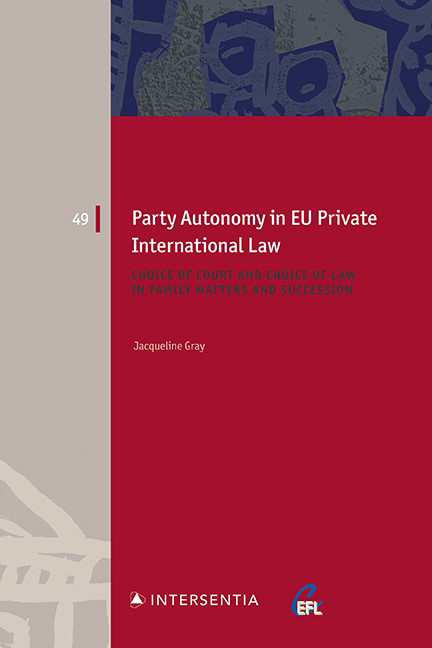 Party Autonomy in EU Private International Law
Party Autonomy in EU Private International Law Chapter 9 - Temporal, Formal and Material Requirements
Published online by Cambridge University Press: 25 May 2021
Summary
INTRODUCTION
This final section of the examination carried out by this book aims to evaluate the choice of court and choice of law provisions contained in the EU private international law rules relating to family matters and succession in the context of the variables that further restrict the formation or enforcement of an exercise of party autonomy. The present chapter, the first of two, considers the impact of the temporal, formal and material (or substantive) requirements that are imposed upon choice.
As such, the chapter will begin by examining the beginning and end points within which party autonomy can be employed in the relevant provisions (9.2.). Following on from this, the formal validity requirements for choice of court and choice of law agreements will be discussed (9.3.). For the present purposes, a wide interpretation of this topic will be employed, extending beyond the form of written agreements in order to cover acceptance of jurisdiction through the parties ‘conduct. Finally the matter of material (or substantive) validity will be considered (9.4.), which will address measures designed to safeguard the fullness of the parties‘ consent. In the same manner as the other main chapters, there will be a concluding synthesis (9.5.) that brings together the findings of this chapter, whilst also evaluating the cohesion between the requirements imposed in related areas and presenting the gaps that have emerged during the course of this evaluation that require addressing.
TEMPORAL LIMITS OF CHOICE
The first topic to be considered in this chapter involves the delineation of the temporal limits for exercising a choice of court or choice of law in the EU private international law rules relating to family matters and succession. This will examine the point at which a choice can be manifested in relation to the proceeding that it concerns, as well as the end point of its exercise in relation to the court being seised of proceedings or the question of whether the designation can continue indefinitely. The following subsections will examine these issues in the choice of court (9.2.1.) and choice of law contexts (9.2.2.).
- Type
- Chapter
- Information
- Party Autonomy in EU Private International LawChoice of Court and Choice of Law in Family Matters and Succession, pp. 211 - 252Publisher: IntersentiaPrint publication year: 2021


